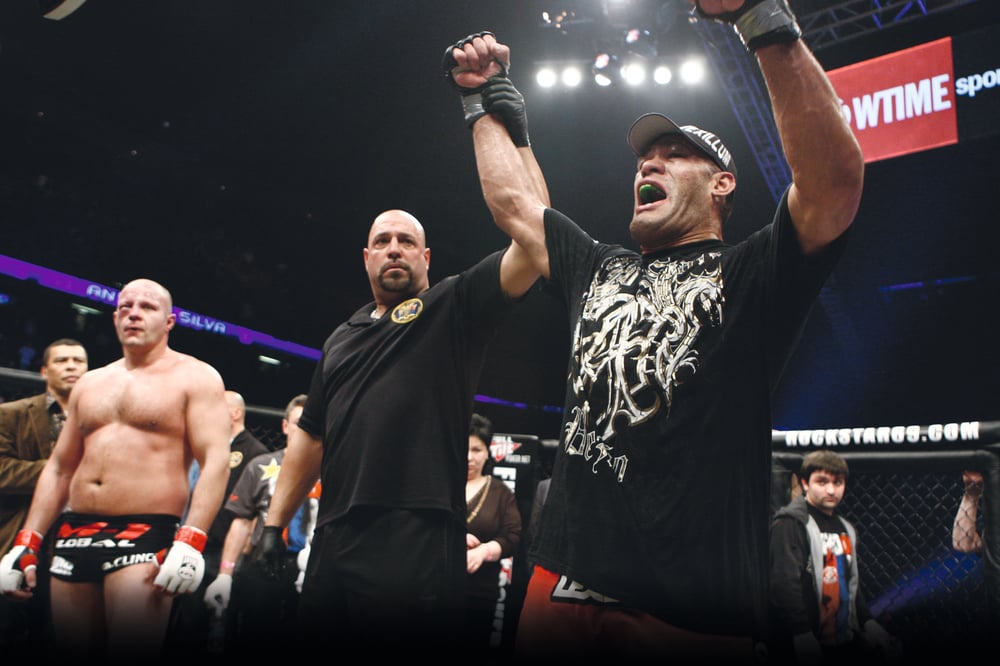
Issue 078
August 2011
An MMA referee for 12 years, Mario Yamasaki has black belts in judo and BJJ and refereed the jiu-jitsu Pan-Am Games. Referees may be seen as bad guys, but they’re there to protect the good guys.
It’s never easy to stand under the glare of 40,000 charged-up MMA fans and decide whether or not to stop a title fight, yet if I decide to, I do it for one reason only: to protect the fighter. That is my main concern. So how do we decide when it’s time to stop the fight due to injury?
First of all, I’d like to stress that it’s not just me who has input into the final decision. The ref, doctors and dressing room inspectors all work together to identify risk factors for the fighters. We are a team. There are times when a referee defers to the doctor for medical input and there are times when a referee recognizes that the fighter has ‘had enough’ and makes the decision on his own.
Take the Aldo vs Hominick fight at UFC 129 for example. After a dominating display from Aldo in the earlier rounds, Hominick was left with a horrific looking hematoma. Quick to act, referee ‘Big’ John McCarthy temporarily stopped the fight while Hominick had Aldo in his guard – a fairly neutral position for both fighters – to get the doctor’s opinion. With such an injury, my immediate concern would be whether a possible fracture to the skull or a fractured orbital socket had occurred. Fortunately for Hominick, he hadn’t sustained either and the doctor allowed him to continue.
So what happens now? As a referee my responsibility would now become even more focused on monitoring that injury and looking for it to possibly get worse, and/or affect his ability to continue to fight. Keep in mind some fighters know that if they have inflicted damage on their opponent that they will target that damage in an effort to make it worse so that the fight will be stopped.
As a referee, I also need to ensure I do not develop tunnel vision and just focus on the obvious injury, the hematoma, which is front and center. A good referee needs to monitor other possible but less obvious injuries and damage on both fighters. In other words, pay attention to the hematoma, but do not neglect the other details of the fight, and remember to pay attention to both fighters – they are both under your care.
Although Hominick thanked John McCarthy for not stopping the fight, the reality is that if the doctor had decided to stop the fight, ‘Big’ John would have had no choice but to adhere to the doctor.
The doctor will always be asking whether the injury is so bad the fighter is not able to intelligently defend themselves. While it may have looked gruesome, Hominick’s hematoma didn’t stop him from seeing properly. In fact, he put a beatdown on Aldo in the final round, so it was the right call. It was the same with GSP and Shields the same night. Although GSP complained he couldn’t see properly, he was in control of the fight and the injury did not appear to significantly hamper him so the fight was not stopped.
But what about instances where the fight was stopped such as Fedor Emelianenko vs ‘Bigfoot’ Silva in Strikeforce? Although Fedor loyalists complained, the fact was Silva dominated ‘The Last Emperor’ by superior positioning and used multiple strikes to significantly damage Fedor’s eye. If you are just absorbing damage, then over time that will lead to injuries and if those injuries become severe enough the referee and/or doctor will stop the fight.
During the break the ringside doctor made the right decision to stop Fedor from continuing.

This fight brings up the next question which is always asked in seminars or by the general public. Do referees officiate fights such as main-event title fights or fights with high-profile athletes differently than others?
The answer is no. Many are surprised to hear that answer, and expect that referee’s will cut high-profile athletes a break, or allow for a more liberal interpretation of the rules of main event matches. This simply isn’t true.
There are no conspiracy theories here with the promoters or commissions saying that you need to let this one go a bit longer. The fighters are in control of the fights and how they fight will determine if they win or not. Fedor lost the fight not through the actions of the referee or the doctor, but because Silva was able to dominate him. Look at the picture of Silva vs Fedor at the end of the fight and ask yourself, who received more damage? The answer is right there.
A referee and doctor both need to recognize the signs when a fighter is done and make the decision for them, and there are ways of doing this. In the end they will take the heat, and may be called every name in the book, but it’s about doing the right thing and protecting your heroes. How can you argue against that?
...









